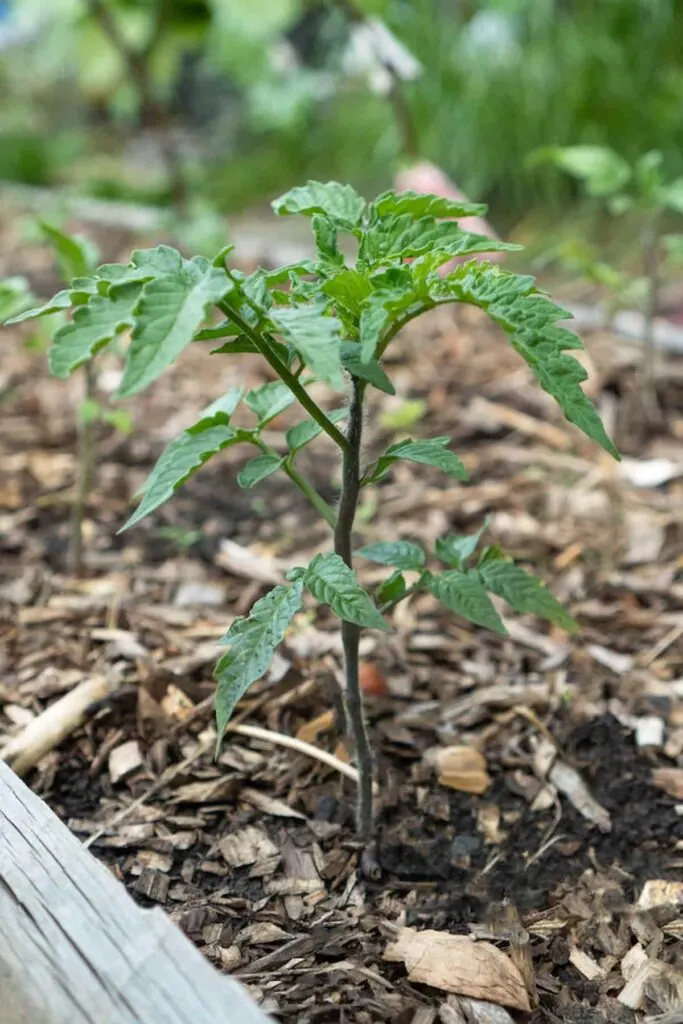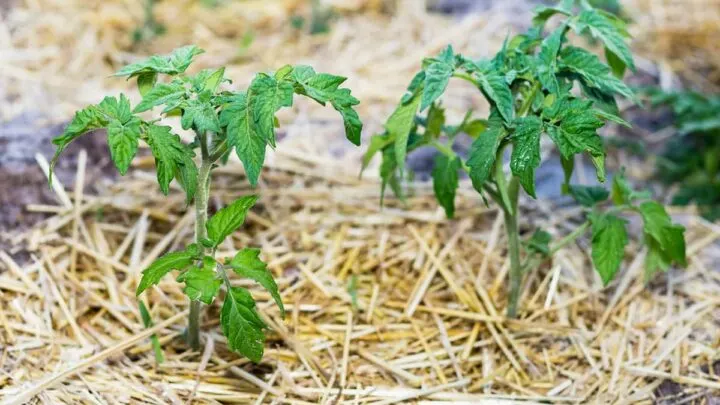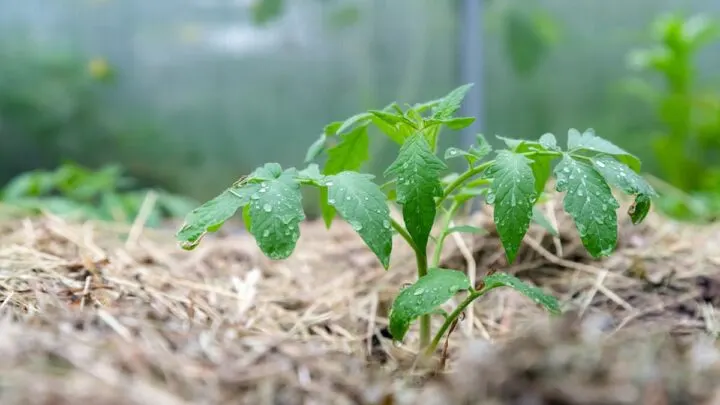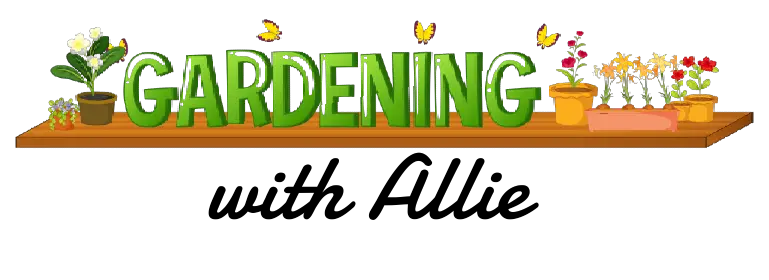Although it may be surprising to some new gardeners, putting mulch in your garden is incredibly beneficial to the plants. This is especially true when it comes to growing tomato plants. However, some types of mulch work better around tomato plants than others.
In this article, we will be explaining what types of mulch work well around tomato plants, along with which types of mulch you should stay away from.

8 Of The Best Types Of Mulch For Tomatoes
There are eight different types of mulch that work well on tomato plants. These mulch types include wood chips, straw, leaves, pine needles, compost, lawn clippings, and even cardboard. In addition, some gardeners prefer to plant smaller plants around their tomato plants to create a living mulch. Here are the eight best types of mulch for tomato plants.
Wood Chip Mulch
Wood chip mulch is among the most popular mulches used in gardens and is also one of the best mulches for tomato plants. This is because wood chips are organic mulch that holds in moisture and slowly releases nutrients as it rots. However, wood chips will not rot very quickly.
Straw Or Hay
Straw or hay is another great option for adding mulch around your tomato plants. This is because both are organic material that decomposes slowly over time and helps to retain moisture. However, you may need to be careful to ensure that your straw does not contain any herbicides before using it as a mulch in your garden.
Leaves
Leaves often act as natural mulch in forests and wooded areas and can also be used as mulch in gardens. This is because leaves act as a barrier for your tomato plants and release nutrients over time as they decompose. Plus, leaves are free and an excellent way to ensure that the soil around your tomato plants retains enough moisture.

Compost
Compost can make for a good mulch for tomato plants as well. This is because compost is nutrient-rich and acts as a fertilizer. Using suitable compost is crucial for a tomato plant’s growth and development.
Pine Needles
Pine needles make for a great mulch because they retain water and release plenty of healthy nutrients for your tomato plants. Pine needles also tend to break down more slowly than leaves or lawn clippings but more quickly than wood chips.
Lawn Clippings
Lawn clippings like grass and pieces of healthy plants that you have pruned can actually be put to good use as a mulch for your tomato plants. Lawn clippings are great for soaking up and releasing moisture, and they also release a ton of healthy nutrients to your tomato plants as they decompose.

Cardboard
Although it may be surprising to some, cardboard also makes for a great mulch around tomato plants. This is because cardboard is made from the pulp of wood, and it has many of the same benefits as wood chips. The only main difference is that cardboard tends to decompose much more quickly than wood chips do.
Living Mulch
Using living mulch involves planting some smaller plants around your larger tomato plant. These smaller plants act as a healthy barrier like other mulch, but it is also a bit more aesthetic. Some of the best plants for living mulch include herbs, flowers, short bulbs, or leafy plants such as lettuce or cabbage.
2 Of The Worst Types Of Mulch For Tomatoes
Two mulch types do not work so well with tomatoes. These two types of mulch that you should avoid include plastic mulch and rubber mulch. Here we will take a closer look at these two mulch types and explain why they do not work so well on tomato plants.
Plastic Mulch
Plastic mulch tends to be a bad choice for tomatoes for several reasons. The first is that plastic mulch prevents water from getting to the soil. This will prevent your tomatoes from getting enough water. In addition to this, plastic tends to trap heat instead of properly insulating your tomato plants. This will further dry out your tomatoes, and it can even kill your tomato plants if you encounter a heat wave.

Rubber Mulch
Rubber mulch is the other mulch type that gardeners should avoid. This is because rubber, like plastic, tends to trap heat and dry the soil. Because tomatoes need lots of water, this mulch type is a no-go. In addition, rubber tends to melt easily in hot temperatures, which means that the rubber chemicals can get to your tomato plants.
What Is The Safest Mulch To Use
The safest mulch to use on tomato plants is organic and breaks down over time. This is because organic materials do not normally pose the risk of passing harmful chemicals onto your tomatoes. Generally speaking, plastic and rubber mulch risk exposing your tomato plants to harmful chemicals when in hot temperatures.
Things To Consider
There are some other things that you may need to consider about placing mulch around your tomato plants. These things include how to put mulch around your tomato plants and what the very best mulch for tomato plants is. Here are some other things for gardeners to consider about placing mulch around tomato plants.
Should You Put Mulch Around Tomatoes?
Yes, you should put mulch around tomatoes. This is because placing mulch around tomato plants helps retain moisture and insulate them against temperature changes. Both benefits aid the tomato plant’s growth and could prevent damage from extreme temperature changes.
In addition, mulch has also been shown to suppress weeds and prevent fertilizer leaching. Both of these things can greatly benefit your tomato plants and other plants in your garden.
How To Put Mulch Around Your Tomato Plants
You should place mulch in your garden several weeks after planting your tomatoes. This will ensure that the soil is warm enough. When placing mulch around your tomato plants, it is best to make sure that there is some space between the mulch and the stems of your tomato plants.
This means that your tomato plant stems and the mulch should not be touching. It is also recommended that the mulch be two feet deep to work properly. You can place this mulch all along a garden bed. In fact, this is the best way to keep weeds away from the area.
What Is The Very Best Mulch For Tomato Plants
The best mulch for tomatoes retains water, provides proper insulation, and slowly releases nutrients over time. Organic materials tend to do the best job at fitting all of these needs. Some great examples of mulches are wood chips, cardboard, straw, and hay. In addition, organic materials like compost, leaves, lawn clippings, and pine needles make for an excellent mulch.

Hi there, my name is Allie and welcome to my blog; GareningWithAllie!
Much of what you see written here is just our personal experiences with gardening. Along with the content I write here, there is also a unique collection of gardening topics covered by some of our close friends. I hope you find everything you read here to be helpful, informative, and something that can make your gardening journey the most lovely experience ever! With that said, Happy Gardening!
